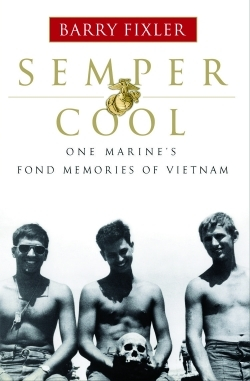Semper Cool
One Marine's Fond Memories of Vietnam
Most books about Vietnam (e.g., The Things They Carried, Born on the Fourth of July) would not be described as optimistic. Despite its upbeat title, Barry Fixler’s Semper Cool isn’t all that optimistic, either. It’s an unabashedly honest memoir without a trace of touchy-feely sentiment.
Fixler grew up in suburban Long Island, New York, as a privileged troublemaker. Though he never wanted for anything—by age sixteen he had a horse, two cars, and a motorcycle—he was determined to be cool, which led to joy rides, petty theft, and the occasional fistfight. Seemingly the only thing he respected were the Marines, whom he learned about through his father’s World War II stories. They made an impression: Without telling his parents, Fixler joined the Marines as a high school senior. “I wasn’t a bad kid,” Fixler writes, “but I just had this gut feeling that I needed more discipline, and I wanted excitement and adventure.”
Later he adds, “All I thought about was adventure and surviving boot camp. I almost forgot the part after that: we all go off to war.” And he did, spending 1967 and 1968 in Vietnam. Most of the book recounts that time, with the best parts focusing on the massive uncertainty and terror surrounding preparation and combat time.
Regarding boot camp at Parris Island, Fixler recalls that he and his fellow recruits were “so bewildered and isolated from the civilian world that it was easy to imagine [drill sergeants] killing us and getting away with it.” As an experienced Marine during the epic, gruesome battle at Khe Sanh, Fixler faces an impossible task: leading a new wave of green, scared Marines that replaced the injured and the dead. “In no way could I show fear to the new guys. I had to raise my confidence to a new level,” he writes. “Those guys picked up on that real fast, and pretty soon, the ones who survived, they talked the same [way].”
Fixler also writes extensively about his life after Vietnam, which includes foiling an armed robbery attempt at his jewelry store and raising funds to treat a Marine who was nearly killed in Iraq. The self-congratulatory tone of those tales somewhat deflates the book’s raw energy and emotion, but it doesn’t tarnish an amazing accomplishment: Fixler entered a gruesome war and emerged as a physically and emotionally whole patriot.
Reviewed by
Pete Croatto
Disclosure: This article is not an endorsement, but a review. The publisher of this book provided free copies of the book to have their book reviewed by a professional reviewer. No fee was paid by the publisher for this review. Foreword Reviews only recommends books that we love. Foreword Magazine, Inc. is disclosing this in accordance with the Federal Trade Commission’s 16 CFR, Part 255.

